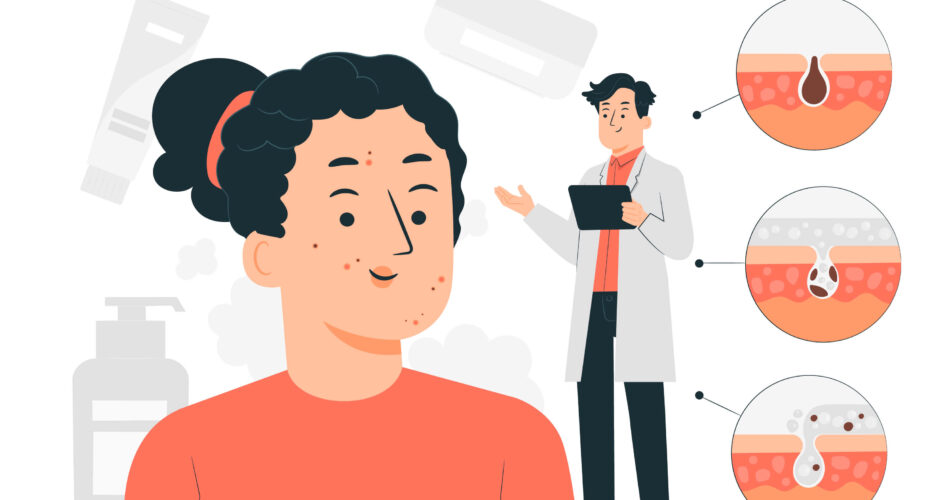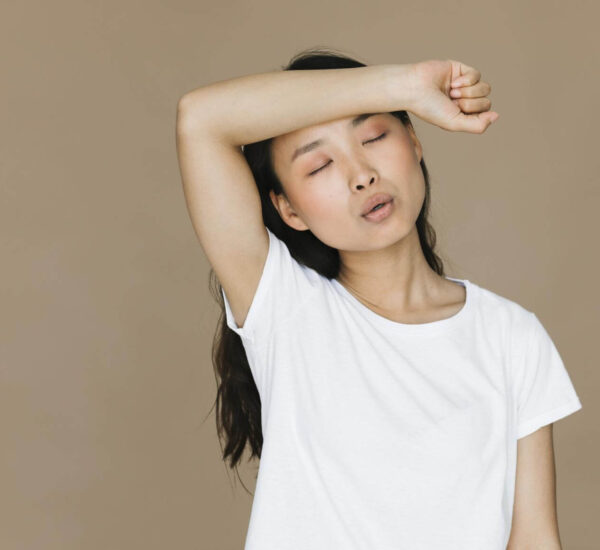Determining what causes acne is one of the aspects that you might be interested in considering that this skin condition affects millions of people worldwide. At a certain age, you might have noticed some changes in your skin like from having smooth skin to having acne-growth on your face. It can be frustrating, especially if you don’t have the right treatment options to get rid of them.
Whether you’re a teenager or an adult who seeks better skin health, this guide can help you. Discover what causes acne, and the effective care tips for preventive measures to achieve a clearer and healthier skin. Let’s begin!
Acne vs Other Skin Conditions
Before diving into what causes acne, let’s first understand what is acne and how it differs from other skin conditions.
Acne is a type of skin condition that develops when the oil glands produce much sebum clogging the hair follicles. This common skin condition can be found on the surface of your skin. Due to this condition, the skin surface can get irritated resulting in symptoms such as pimples, white heads, black heads, cysts, nodules, and papules.
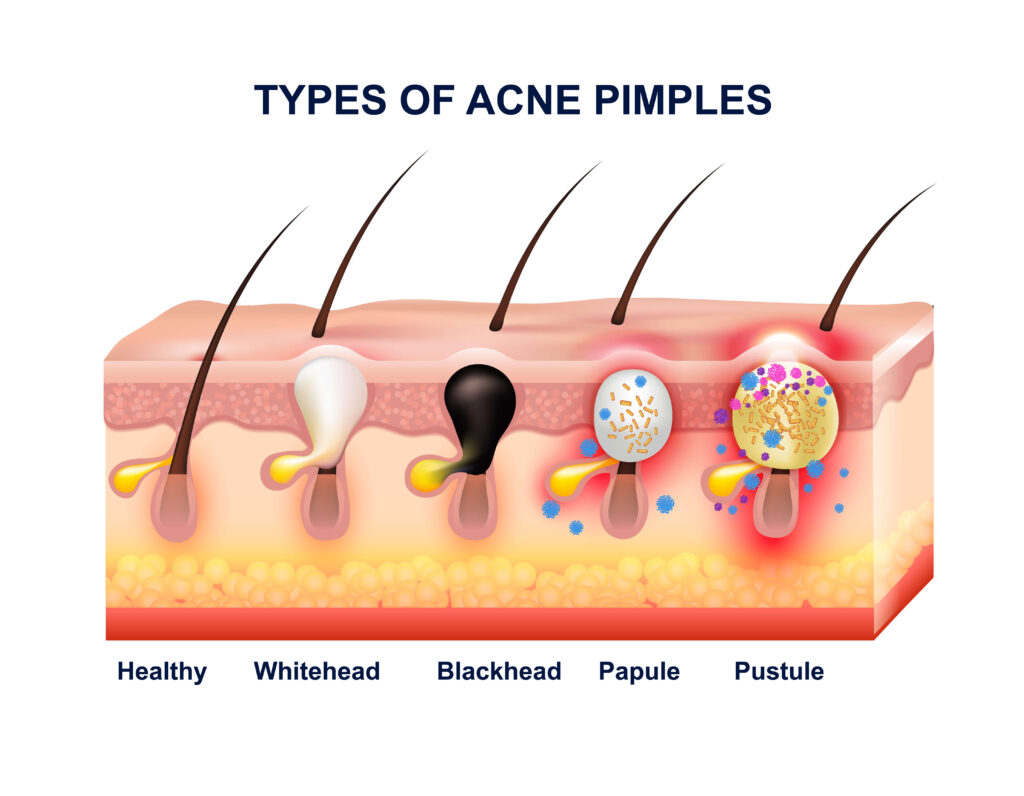
While acne is a common skin condition, people might still confuse it with other ailments like rashes, and the likes. It is true that skin conditions may result in skin irritation, but acne is a result of plugged follicles. Meanwhile, other skin illnesses are a result of other factors such as other health conditions. Although, some types of acne may be triggered by other factors. These types can include hormonal acne, cystic acne, fungal acne, and nodular acne. If any of these severe forms of acne develops, it’s best to seek a consultation with a dermatologist immediately.
Read this related article to learn more about the other skin conditions and their treatment.
Severe Types of Acne
Acne can present itself in different forms, including:
- hormonal acne
- cystic acne
- fungal skin acne
- nodular acne
What Causes Acne?
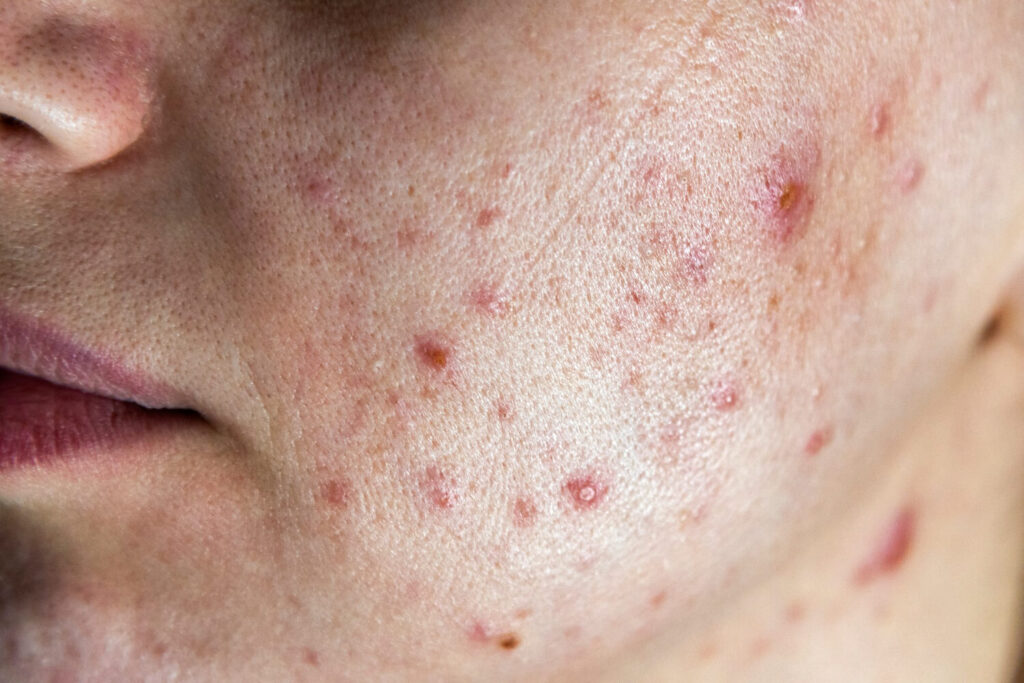
As mentioned, the development of acne begins when hair follicles become clogged with oil. However, other factors also play a huge role resulting in this skin condition.
Here are the known factors recognized as causes of acne:
Excess Sebum Production
The sebaceous glands in the skin produce sebum (oil) to keep the skin moisturized. However, an overproduction of sebum can clog pores and lead to acne. Excess production of sebum happens due to numerous factors (hormonal imbalance, medications, and lifestyle choices).
Clogged Hair Follicles
When dead skin cells do not shed properly, they can accumulate in hair follicles, causing blockages that result in acne. Oftentimes, it can be triggered due to too much oil on your pores, the tiny holes on the surface of the skin.
Bacteria
Meanwhile, the presence of bacteria can also lead to acne. Commonly, the bacterium Cutibacterium acnes (formerly Propionibacterium acnes) can multiply in clogged pores, leading to inflammation and pimples. –
Hormonal Changes
On the other hand, hormonal fluctuations, especially during puberty, menstruation, or pregnancy, can increase oil production that contribute to acne. Acne formed due to hormonal changes can result in types of lesions, especially if you continue to be in certain situations. This involves stressful situations, pricking of pimples, staying in a polluted environment, etc.
Diet and Lifestyle
Moreover, certain foods can trigger the development of acne. Some of those foods are high in sugar and dairy. It can be associated with insulin that boosts the androgen hormone to produce more sebum, resulting in acne production. In terms of lifestyle choices, lack of sleep, and stressful environment can trigger acne. The stress from both situations can also increase the production of androgen hormone that can increase oil on skin. Thus, triggering acne and worsening your healthy skin.
How to Avoid Acne Growth on Skin
While identifying what causes acne can be crucial information for a better skin health, discovering how to get rid of them should also be a priority. Acne can be stubborn, especially when exposure to the factors causing the acne are always present. Fortunately, there are effective preventive measures to try to correct habits and adopt a healthier skin.
Tip 1: Cleanse your face before sleeping and in the morning after waking up
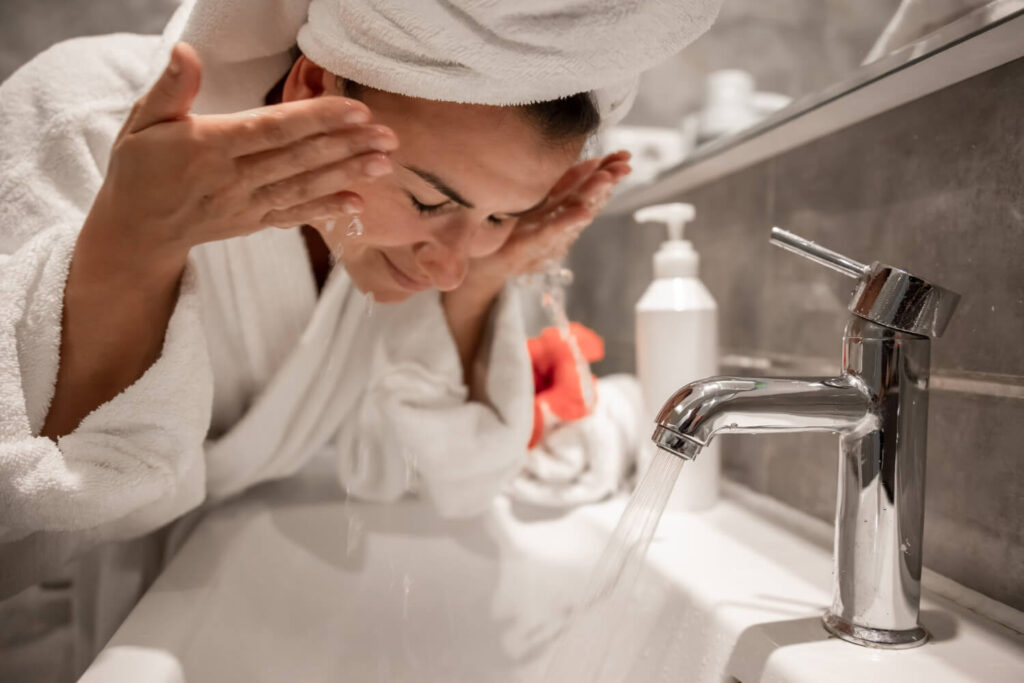
The constant production of sebum is great for moisturizing the face, but excess oil to sit on the skin and pores can cause skin conditions like acne. That’s why it is ideal to always cleanse the face with facial cleansers to remove the mixture of oil and dirt build up. Thus, ensuring to avoid clogged pores and a better skin surface.
Tip 2: Choose less harsh products on your face
When it comes to skin products, it’s ideal to avoid harsh skincare items to protect your skin health. Use non-comedogenic products that won’t clog pores. For instance, products with salicylic acid, benzoyl peroxide, and retinoids help unclog pores and reduce inflammation. If you are having a hard time choosing a product, it’s best to visit a dermatologist for guidance.
Tip 3: Avoiding pricking and touching your acne
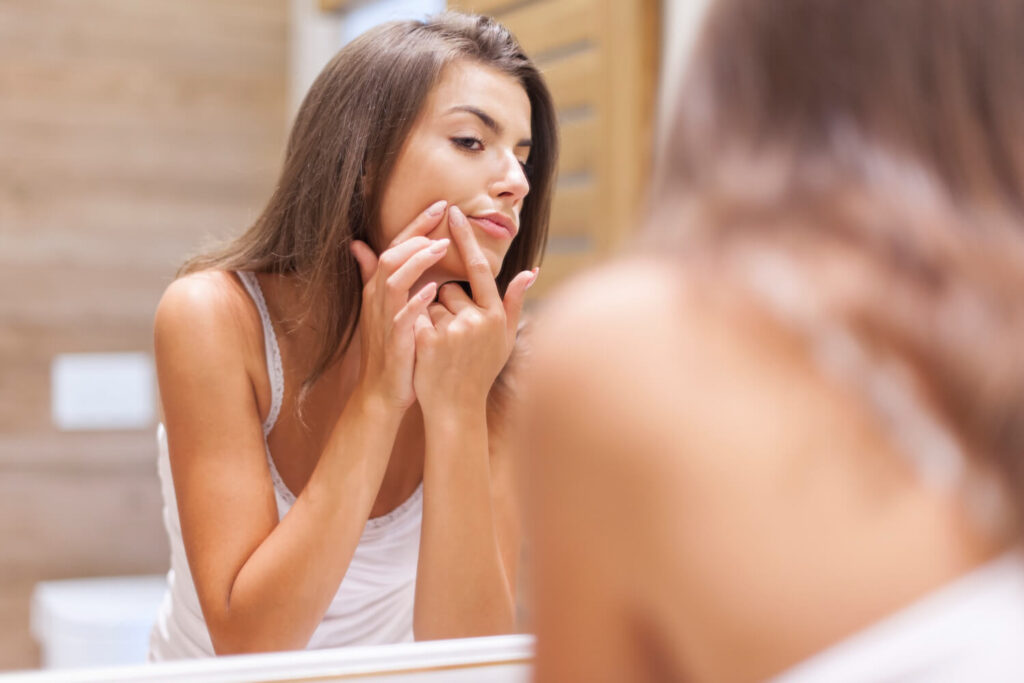
One of the common reasons for having a severe breakout is due to the constant touching of the face. Your hands can transfer bacteria and oils to the other parts of your face whenever you prick your acne. That’s why it’s best to let your acne heal without pricking them.
Tip 4: Taking oral medications for acne
Aside from topical treatments, other forms of acne treatment can also involve taking medications to get rid of severe forms of acne. Usually, dermatologists can prescribe oral medications like antibiotics, hormonal treatments, and isotretinoin to address the moderate to severe acne condition.
Tip 5: Visiting a dermatologist for professional procedures
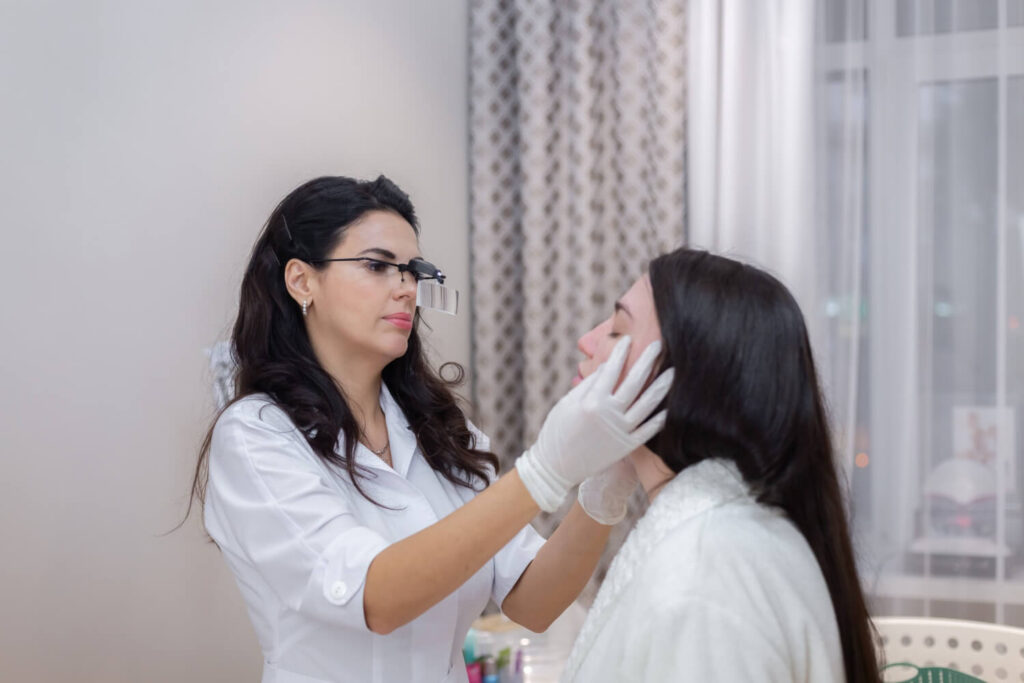
Lastly, considering a healthcare provider for professional help can never go wrong. Addressing your acne concerns must always include a skin exam with a dermatologist to analyze your current condition fully. That way, they can recommend a more pressing form of treatment, if your skin warrants it. Some of the possible procedures are chemical peels, laser therapy, and drainage procedures, which can treat persistent acne.
Other care tips can also work, which can serve as supporting healthcare treatment for your acne:
- Maintaining a healthy diet: Incorporate foods rich in vitamins and antioxidants while avoiding excessive sugar and dairy.
- Managing stress: Engage in stress-relieving activities like exercise, meditation, or hobbies.
- Home remedies: Ingredients like tea tree oil, aloe vera, and honey may help reduce acne naturally.

How to Consult A Dermatologist Near Me
If over-the-counter treatments are not effective, or if you experience severe acne with nodules or cysts, it is advisable to consult a dermatologist. Fortunately, finding dermatology doctors in the Philippines is easy with the help of healthcare platforms like NowServing.
Helpful Links to Consult with A Dermatologist
Option A: Immediate Consultation with A Dermatologist
Option B: Booking Online Consultation with A Dermatologist
Option C. Finding a Dermatologist and Schedule Your Face-to-face or Online Consultation
Conclusion
Understanding what causes acne and taking proactive steps can significantly improve skin health. By maintaining a consistent skincare routine, adopting a balanced lifestyle, and seeking professional help when needed, you can effectively manage and treat acne, achieving clear and radiant skin.
If you’re struggling with acne and need professional advice, book an online consultation with a dermatologist to get started on your journey to clear skin today.
Acne Knowledge Quiz
Test what you know about acne causes and treatment
